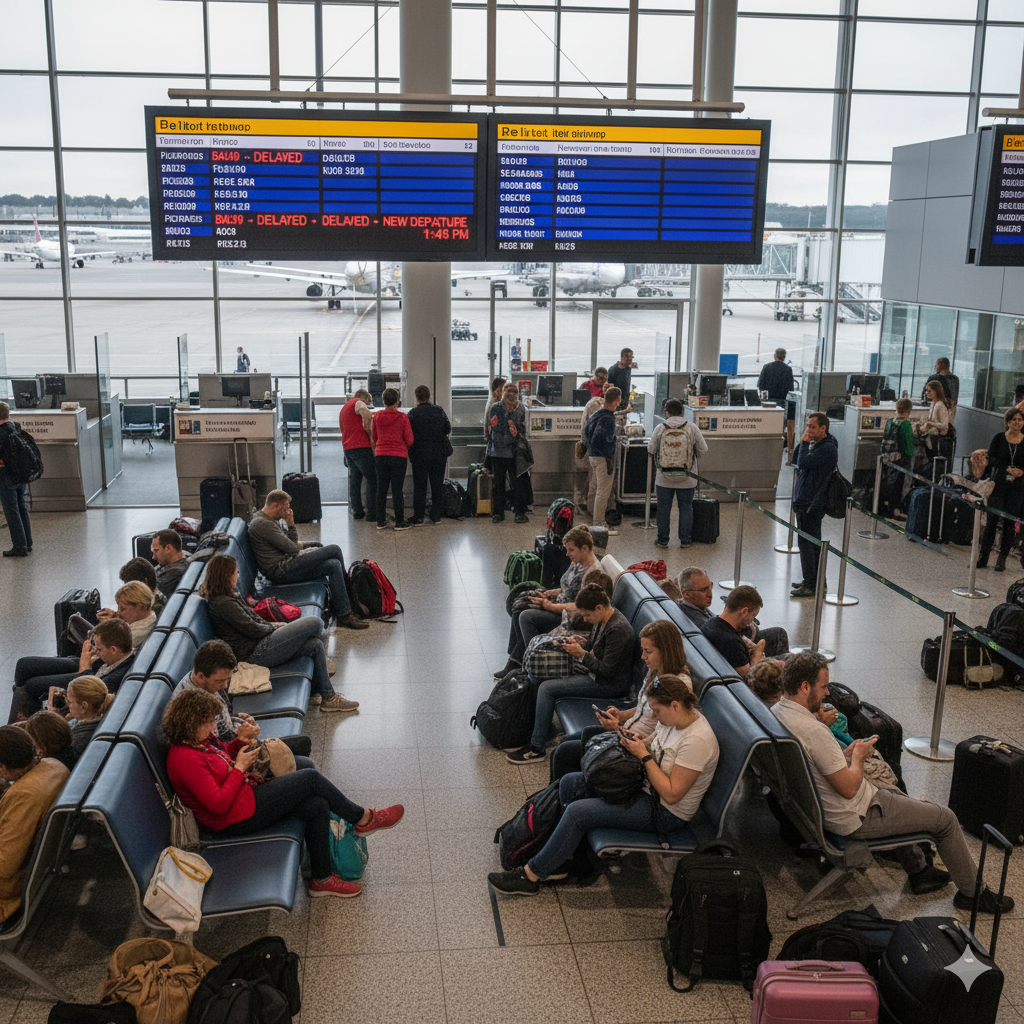The Worst Part of Traveling Is the Traveling Part
Jesse Morris • October 14, 2025
Ways to Improve Your Flying Experience

Ah, travel. The sun on your face, cobblestone streets underfoot, new cuisines. But when it comes to getting there — hello gate delays, rebookings, frantic searches for customer service — sometimes the trip feels like a glitch in your own story.
In a post-COVID world, delays and disruptions seem to have become part of the package. But you don’t have to resign yourself to airport purgatory. With a little forethought, the right tools, and maybe an extra dose of patience, you can tip the odds in your favor.
Why Air Travel Feels Like It’s Getting Harder
Book Smart — Because the Best Defense Is a Good Offense
Avoid fragile connections & tight layovers
Choose flexible fares
Use a single airline alliance
Check historical performance
Use Tech Like It’s 2025 — Because It Is
Airline apps + alert systems
Flight-tracking tools
These tools often push alerts on emerging delays before they hit the airline “announcement” stage.
Forwarding & calendar integrations
Pack Patience (and Everything Else)
Mental prep: assume “something will go wrong”
Buffer time in your itinerary
Breathe, stretch, reset
Use downtime productively
Humor & perspective
Be Comfortable (Because You Might Be Waiting)
Carry-on essentials: the “just in case” kit
Comfort and wellness gear
Lounges — if you can access them
When Things Go Wrong — Be Proactive
Act early
Document everything
Negotiate vouchers vs cash
Use claim services if needed
In a post-COVID world, delays and disruptions seem to have become part of the package. But you don’t have to resign yourself to airport purgatory. With a little forethought, the right tools, and maybe an extra dose of patience, you can tip the odds in your favor.
Why Air Travel Feels Like It’s Getting Harder
Let’s set expectations. It’s not just you. Here are some structural shifts that mean the “getting there” part is more fragile than ever:
- Airlines have trimmed operating margins and cut redundancy, leaving little backup when things break.
- Delays cascade. One mechanical issue, a late incoming flight, even a staffing lapse can ripple outward.
- “Low-certainty” routes (less trafficked, smaller markets) are more prone to rebookings or cancellations.
- External pressures — weather, air traffic control, ground ops, maintenance — are still major wild cards.
- Demand is rebounding, and systems are still catching up.
- Customer service channels get overwhelmed when multiple flights go off-schedule.
Regulatory shifts also matter: in the U.S., a 2024 DOT rule now requires airlines to issue automatic refunds when a canceled or significantly changed flight leaves you stranded and you reject the airline’s rebooking offers. That said, airlines aren’t necessarily required to compensate you for every delay. Under U.S. rules, unless you were involuntarily “bumped,” compensation for delays is not guaranteed.
Still, airlines must rebook you (at no extra cost) under many circumstances — and many offer meal vouchers or hotel stays if they caused the misconnect and overnight delays.
The bottom line: you should know your rights (or at least your possibilities) — but also accept that not every delay will come with cash in hand.
Book Smart — Because the Best Defense Is a Good Offense
Favor early, nonstop flights
Early morning departures are less likely to accumulate delays throughout the day. Later flights often inherit all the “stuff that went wrong earlier.” And nonstops remove intermediate transfer risk.
Avoid fragile connections & tight layovers
Pick routes through robust hubs rather than small, isolated airports. And give yourself breathing room — 2+ hours domestically, 3+ internationally, more if you're changing carriers or going through heavy security.
Choose flexible fares
If your fare allows changes or cancellations (or refundable options), that flexibility can be a lifesaver when schedules shuffle.
Use a single airline alliance
If your outbound, return, and connecting legs are within the same alliance, the airline is more likely to treat your itinerary as a single “bundle” when disruptions occur — and rebooking is usually smoother.
Check historical performance
Before you book, use tools or data sources that show a route’s delay history or airline on-time performance. Less “iffy” = less risk.
Use Tech Like It’s 2025 — Because It Is
If you’re not already, it’s time to treat airline apps and flight-tracking tools as essential gear, not optional extras.
Airline apps + alert systems
- Install and use your airline’s official app. It often pushes gate changes or rebooking options before they reach the screens.
- Enable push alerts, SMS, and email updates. The earlier you know something changed, the more options you have.
- Some apps will auto-suggest alternate flights or let you rebook within the app.
- Many airlines now integrate chat or in-app messaging support. This can let you skip phone lines or gate crowds and request rebooks or refunds digitally.
Chat / messaging / social media
If phone lines are swamped, use chat or messaging channels — they sometimes respond faster.
Don’t hesitate to ping the airline’s Twitter/X or Facebook support handle (e.g. “@AirlineXHelp”). Public visibility occasionally spurs faster responses.
Flight-tracking tools
Use services like FlightAware, FlightRadar24, Flighty, or others to monitor your flight in real time: see delays, gate changes, aircraft rotations, tail movements.
These tools often push alerts on emerging delays before they hit the airline “announcement” stage.
Forwarding & calendar integrations
Forward your booking confirmation to tools that extract flight details, add to your calendar, and push reminders or status updates. Keeps everything in one place rather than buried in your inbox.
Pack Patience (and Everything Else)
You can’t avoid every delay — so fold some flexibility into your kit. Here’s how:
Mental prep: assume “something will go wrong”
Expect disruption. If your default assumption is that the schedule might shift, you’ll be calmer when it does. It stops being a shock.
Buffer time in your itinerary
Leave margin in your plans so a delay doesn’t trigger a domino effect. If your trip allows, arrive at your destination a day early before critical events.
Breathe, stretch, reset
When the dreaded “DELAYED” appears on the board, take a beat. Stretch, hydrate, walk the terminal. Use the pause to reset rather than escalate immediately.
Use downtime productively
Read, plan parts of your trip, catch up on podcasts, journal, reply to emails. Turns frustration into semi-useful time.
Humor & perspective
If you can wink at the absurdity ("Yep, another gate swap!") you rob it of some emotional stick. It’s you vs. the system — you may not win, but you can stay sane.
Be Comfortable (Because You Might Be Waiting)
If you’re going to sit in a terminal, do it with dignity.
Carry-on essentials: the “just in case” kit
- Change of clothes + travel toiletry basics
- All vital medications
- Chargers & power bank
- Travel umbrella or compact rain layer
- Snacks that last (nuts, protein bars, fruit leather)
- Entertainment (e-reader, tablet, offline content)
If your checked bag is delayed, you’ll at least have clothes and essentials.
Comfort and wellness gear
- Noise-canceling headphones
- Travel pillow + eye mask
- Compression socks
- Layered clothing (plane temps vary)
- Reusable water bottle (fill after security)
- Travel-size moisturizer, lip balm
Hydration & mobility
Drink water often (airplane air is dry). Walk aisles, stretch legs, rotate ankles. Stay ahead of stiffness and fatigue.
Lounges — if you can access them
If your status, credit card, or day pass gives lounge access — use it. Lounges often have better seating, calmer atmosphere, stronger WiFi, snacks, letting you survive delays more gracefully.
When Things Go Wrong — Be Proactive
A disruption doesn’t have to spell defeat. Here’s your game plan when Delay City strikes.
Act early
The moment you see a delay or cancellation: check alternate flights, open the airline app, call or chat — rebooking slots vanish quickly.
Document everything
Take screenshots of your original itinerary, delay alerts, chat threads, gate changes, boarding passes. This documentation is gold if you submit a claim.
Know your rights & airline policies
- U.S.: Airlines generally don’t have to compensate you for a delay (unless you’re involuntarily bumped).
- But under the 2024 DOT rule, if your flight is canceled or significantly changed and you reject the rebook offer, you’re guaranteed a cash refund (not just a voucher).
- Many airlines provide meal vouchers or hotel stays if they caused the misconnect and you have to stay overnight.
- Airlines are required to provide timely change notifications.
Check your carrier’s “Conditions of Carriage” section — it often spells out rebooking priorities, accommodations, etc.
Escalate smartly
Stay calm but persistent. Ask politely for supervisors. Use social media if gate agents are stonewalling. Sometimes visibility gets you faster help.
Negotiate vouchers vs cash
If given a voucher or credit, politely ask if cash or refund is possible (especially under new DOT rules). If rebooking options offered aren’t acceptable, you may prefer a refund.
Use claim services if needed
If you feel entitled to compensation (especially on international flights under treaties like the Montreal Convention), you can work with services like AirHelp to file claims.
Flying has proven to be one of the most challenging parts of the vacation experience so be prepared. Unless you plan to stop traveling all together you will likely have a less than optimal experience when you head to the airport. Setting yourself up for success can help ensure the start or end of your vacation experience doesn't ruin the wonderful things that happen in the middle.
Questions? Reach out to us at info@webooktravel.net
Questions? Reach out to us at info@webooktravel.net
